Intro
Discover Kaiser Permanente Medical Schools innovative approach to healthcare education, emphasizing preventive medicine, patient-centered care, and community health, shaping the future of medical professionals.
The field of medicine is constantly evolving, with new technologies, treatments, and approaches being developed to improve patient care and outcomes. One of the key factors in driving this evolution is the education and training of future physicians. In recent years, there has been a growing recognition of the need for innovative and effective medical education programs that can prepare students to meet the complex healthcare needs of the 21st century. One institution that is at the forefront of this effort is the Kaiser Permanente Medical School.
The Kaiser Permanente Medical School is a relatively new institution, having been established in 2016. However, despite its relatively short history, the school has already made a significant impact on the field of medical education. The school's mission is to provide a comprehensive and innovative medical education that focuses on preparing students to become outstanding physicians who can provide high-quality, patient-centered care. The school's curriculum is designed to be highly interactive and immersive, with a strong emphasis on hands-on learning, teamwork, and collaboration.
The school's approach to medical education is centered around several key principles, including a focus on primary care, a commitment to diversity and inclusion, and a emphasis on the development of strong interpersonal and communication skills. The school's faculty is comprised of experienced and respected physicians and educators who are dedicated to helping students achieve their full potential. The school's state-of-the-art facilities and cutting-edge technology provide students with a unique and supportive learning environment that is designed to foster academic excellence and personal growth.
Kaiser Permanente Medical School Curriculum
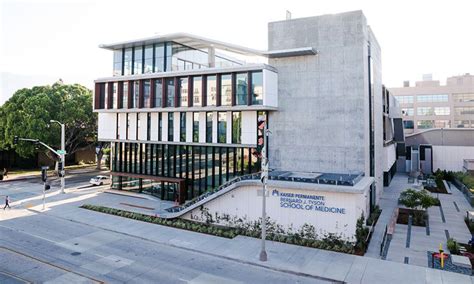
One of the unique features of the Kaiser Permanente Medical School curriculum is its emphasis on primary care. The school recognizes that primary care is the foundation of a high-quality healthcare system, and that primary care physicians play a critical role in preventing illness, promoting health, and coordinating care. The school's curriculum is designed to provide students with the knowledge, skills, and attitudes necessary to become outstanding primary care physicians. The school's faculty includes experienced primary care physicians who serve as role models and mentors for students.
Key Components of the Curriculum
The Kaiser Permanente Medical School curriculum includes several key components, including: * Basic sciences: The basic sciences component provides students with a strong foundation in the principles of medicine, including anatomy, biochemistry, and physiology. * Clinical sciences: The clinical sciences component provides students with hands-on experience in a variety of clinical settings, including hospitals, clinics, and community health centers. * Elective courses: The elective courses component provides students with the opportunity to explore their interests and passions in greater depth. * Primary care: The primary care component provides students with the knowledge, skills, and attitudes necessary to become outstanding primary care physicians.Kaiser Permanente Medical School Admissions
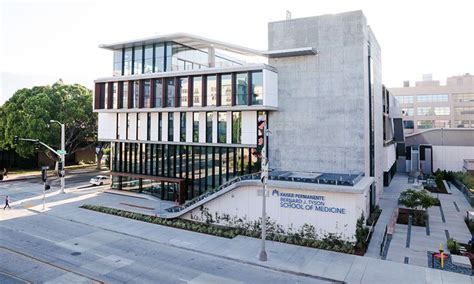
The school's admissions process includes several key steps, including:
- Submission of application: Applicants must submit their application, including transcripts, letters of recommendation, and personal statement.
- Review of application: The admissions committee reviews each application, considering a range of factors, including academic performance, clinical experience, and personal characteristics.
- Interview: Selected applicants are invited to interview with the admissions committee.
- Notification of decision: Applicants are notified of the admissions committee's decision.
Admissions Requirements
The Kaiser Permanente Medical School admissions requirements include: * Bachelor's degree: Applicants must have a bachelor's degree from an accredited institution. * Prerequisite courses: Applicants must have completed a set of prerequisite courses, including biology, chemistry, and physics. * MCAT: Applicants must take the Medical College Admission Test (MCAT). * Clinical experience: Applicants must have clinical experience, either through volunteering or working in a healthcare setting.Kaiser Permanente Medical School Faculty

The school's faculty includes:
- Primary care physicians: The school's faculty includes experienced primary care physicians who serve as role models and mentors for students.
- Specialists: The school's faculty includes specialists in a range of fields, including surgery, pediatrics, and obstetrics and gynecology.
- Researchers: The school's faculty includes researchers who are committed to advancing the field of medicine and improving patient care.
Faculty Expertise
The Kaiser Permanente Medical School faculty has expertise in a range of areas, including: * Primary care: The school's faculty includes experienced primary care physicians who are experts in the prevention, diagnosis, and treatment of common medical conditions. * Specialty care: The school's faculty includes specialists in a range of fields, including surgery, pediatrics, and obstetrics and gynecology. * Research: The school's faculty includes researchers who are committed to advancing the field of medicine and improving patient care.Kaiser Permanente Medical School Campus
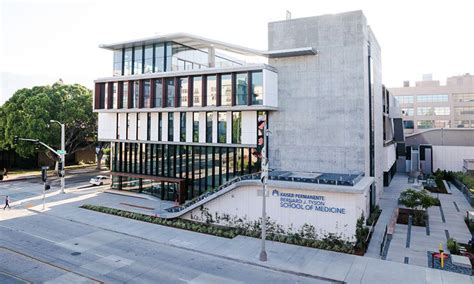
The school's campus is designed to foster academic excellence and personal growth, and provides students with a range of opportunities to engage with faculty, peers, and the broader community. The campus is also committed to sustainability and environmental responsibility, and includes a range of green features, including solar panels and a green roof.
Campus Facilities
The Kaiser Permanente Medical School campus includes a range of facilities, including: * Classrooms: The school's classrooms are equipped with state-of-the-art technology, including interactive whiteboards and video conferencing equipment. * Laboratories: The school's laboratories provide students with hands-on experience in a range of scientific disciplines, including anatomy, biochemistry, and physiology. * Clinical skills centers: The school's clinical skills centers provide students with the opportunity to practice clinical skills in a safe and supportive environment.Kaiser Permanente Medical School Student Life
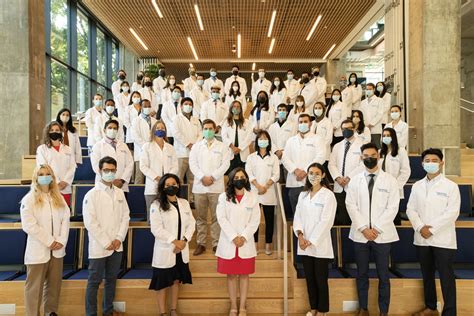
The school's student life is designed to foster academic excellence, personal growth, and professional development, and provides students with a range of opportunities to pursue their interests and passions. The school's student services include academic support, counseling, and career advising, and are designed to help students achieve their full potential.
Student Organizations
The Kaiser Permanente Medical School student organizations include: * Cultural organizations: The school's cultural organizations provide students with the opportunity to connect with peers from diverse backgrounds and cultures. * Community service groups: The school's community service groups provide students with the opportunity to engage with the broader community and make a positive impact. * Recreational clubs: The school's recreational clubs provide students with the opportunity to pursue their interests and passions outside of the classroom.Kaiser Permanente Medical School Research
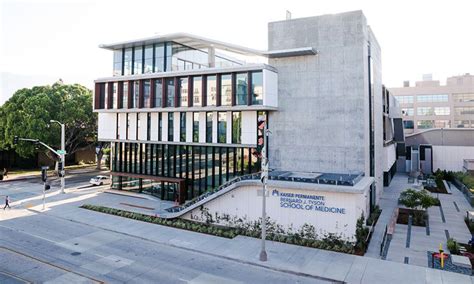
The school's research program is designed to foster innovation, collaboration, and discovery, and provides students with the opportunity to engage with faculty and peers in a range of research activities. The school's research facilities include state-of-the-art laboratories, clinical research centers, and data analysis facilities.
Research Areas
The Kaiser Permanente Medical School research program includes a range of areas, including: * Primary care: The school's primary care research program is focused on improving the prevention, diagnosis, and treatment of common medical conditions. * Specialty care: The school's specialty care research program is focused on advancing the field of specialty care and improving patient outcomes. * Health services research: The school's health services research program is focused on improving the delivery and organization of healthcare services.Kaiser Permanente Medical School Accreditation

The school's accreditation process includes a range of activities, including self-study, peer review, and site visits. The school's accreditation is subject to periodic review and renewal, and the school is committed to maintaining the highest standards of academic excellence and continuous improvement.
Accreditation Process
The Kaiser Permanente Medical School accreditation process includes: * Self-study: The school conducts a comprehensive self-study to assess its compliance with accreditation standards. * Peer review: The school's self-study is reviewed by a team of peer reviewers who assess the school's compliance with accreditation standards. * Site visit: The school undergoes a site visit by a team of accrediting officials who assess the school's compliance with accreditation standards.What is the mission of the Kaiser Permanente Medical School?
+The mission of the Kaiser Permanente Medical School is to provide a comprehensive and innovative medical education that focuses on preparing students to become outstanding physicians who can provide high-quality, patient-centered care.
What is the curriculum of the Kaiser Permanente Medical School?
+The curriculum of the Kaiser Permanente Medical School is designed to provide students with a comprehensive and well-rounded education that prepares them to become outstanding physicians. The curriculum includes basic sciences, clinical sciences, and elective courses.
How do I apply to the Kaiser Permanente Medical School?
+To apply to the Kaiser Permanente Medical School, you must submit your application, including transcripts, letters of recommendation, and personal statement. The school's admissions committee uses a holistic approach to evaluate applicants, considering a range of factors, including academic performance, clinical experience, and personal characteristics.
We hope this article has provided you with a comprehensive overview of the Kaiser Permanente Medical School. If you have any further questions or would like to learn more about the school, please don't hesitate to comment or share this article with others. The Kaiser Permanente Medical School is a unique and innovative institution that is committed to providing students with a comprehensive and well-rounded education that prepares them to become outstanding physicians. We encourage you to explore the school's website and learn more about its mission, curriculum, and admissions process.
